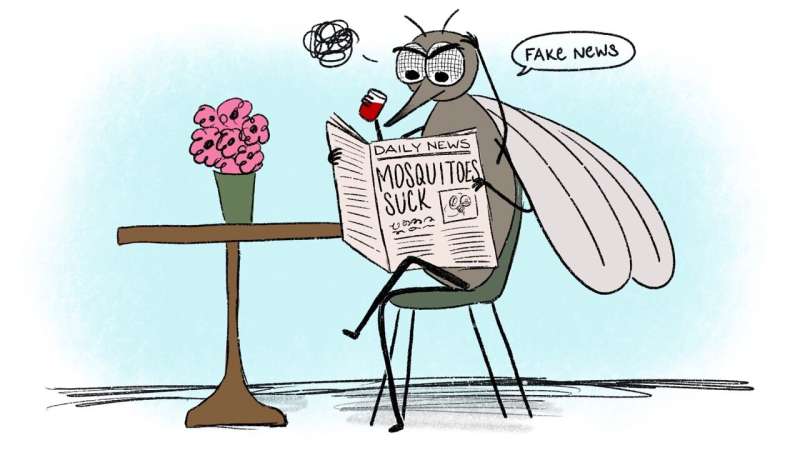Five mosquito myths and one truth that really bite

Nothing kills a hammock hangout, Sunday hike or backyard barbecue faster than the stealthy blitz of the mosquito, those vampires of the insect world that strike fast and leave red, itchy bumps—or worse—in their wake.
But even after a century of research, there are still things we’re discovering about the mosquito, including the conditions—such as food and habitat—that bolster a virulent population, and how those environments impact some humans more than others.
University of Maryland doctoral candidate Sarah Rothman hopes her research with environmental science and technology Professor and Chair Paul Leisnham on the relationship between non-native mosquitoes and plants found in urban areas of differing socioeconomic status might take some of the itch out of summer.
Her motivations go beyond irritation. Mosquitoes, she said, are particularly detrimental to vulnerable communities and transmit dozens of pathogens, such as malaria, Zika and West Nile virus, which infects thousands of people a year in the U.S.; the longer a mosquito lives, which correlates to the nutrition it receives early in life from its plant-based environment, the more people it can bite—and potentially infect.
“It’s so important for public health and environmental justice,” she said.
As Maryland reaches peak mosquito season, we dive into five myths about the most despised insect on the planet—and one truth that for some readers, just sucks:
- To mosquitoes, humans are an all-you-can-eat (or drink) buffet. (False!) Only female mosquitoes feast on human and animal blood—but to produce eggs, not for their own sustenance. Adult mosquitos live on sugars and nutrients found in vegetation, similar to butterflies and bees, which means that their only redeeming quality, said Rothman, is that they can act as pollinators and support ecosystems as a food source for various predators. “I don’t know if that’s enough to outweigh the vast human body count,” said Rothman.
- Mosquitoes are a problem only when the sun goes down. (False!) Anyone who has sensed a raised welt under a noonday sun knows that mosquitoes are no longer relegated to happy hour. Mosquitoes native to Maryland aren’t on a bloodthirsty rampage in broad daylight: it’s the tiger mosquito, an invasive, aggressive breed imported from Asia in the 1980s. “The tiger mosquito has been called the worst invader of the century,” said Rothman. “It has spread rapidly and is prevalent here in Maryland.”
- There are fewer mosquitoes in cities than the ‘burbs. (False!) Both the tiger mosquito and the common house mosquito are well adapted to urban environments, thriving in trash cans, flower pots and gutters. “They’re 90% or more of what we find in cities,” Rothman said. But disinvested communities may also prove to be the most infested ones: She and her colleagues in Leisnham’s lab are wrapping up a National Science Foundation-funded study that compares mosquito populations in low-income neighborhoods in Baltimore to more affluent ones, due to the organic matter and water-collecting trash littering the city’s abundant vacant lots.
- Draining the bird bath or kiddie pool will solve your mosquito problem. (False!) Mosquitoes can lay their eggs in as little as 1 teaspoon of water, which can collect in pet bowls, tarps and children’s toys. When it comes to water, Rothman recommends following the “four Es”: eliminate (throw out, modify or store water-holding containers), exchange (containers that collect with ones that don’t), empty (regularly) and emaciate (add a mosquito-fighting bacterium, which destroy larvae, to water you can’t eliminate). The amount—and kind—of yard detritus can also increase your numbers. Leaves and other plant matter create habitat and supply nutrients for a thriving population. And if you need another reason to go native in your yard, previous research indicates that non-native plants provide better nutrition and environments for mosquitoes than native ones.
- Mosquitoes are territorial. (False!) Even the most fastidious homeowner will endure continued assaults if the neighbor next door is slacking off. Rothman said mosquitoes won’t generally travel more than a block—they often don’t need to—but don’t mind jumping a backyard fence for new prospects. “If your neighbor has a whole bunch of standing water, it will absolutely be a problem for you,” she said.
- You may be just their type. (True!) Research studies on blood type, the amount a person sweats and their microbiome (which includes bacteria naturally found on skin) have shown that some people are more prone to bites than others, Rothman included. “In the Ph.D. world, people do tend to gravitate toward stuff that they love,” she said. “But I’m doing it for the opposite reason: I’m a prime target.”
Citation:
Five mosquito myths and one truth that really bite (2023, July 26)
retrieved 27 July 2023
from https://phys.org/news/2023-07-mosquito-myths-truth.html
This document is subject to copyright. Apart from any fair dealing for the purpose of private study or research, no
part may be reproduced without the written permission. The content is provided for information purposes only.
For all the latest Science News Click Here
For the latest news and updates, follow us on Google News.

